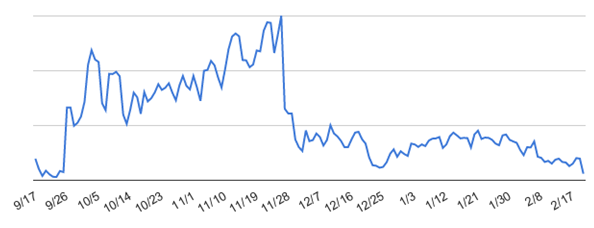It's not uncommon for digital marketing agencies to share portfolios filled with attractive designs and impressive metrics that shout to the world, "This is why we're good at what we do." (In fact, that sort of flaunting is expected these days.)
You can certainly look through MotionPoint's website and find examples of us doing the same thing. And why wouldn't we? We've helped some of the biggest brands in the world generate outstanding successes in new domestic and international markets.
But what if we looked at performance from another angle—say, one where we see a negative outcome instead of a positive one? Failure can often be a better teacher than success, after all.
Here’s an example that should illustrate the impact on a localized website when a client chooses to not do something great (which would otherwise improve engagement with global customers).
Let's first review a table that highlights the impact of removing MotionPoint's exclusive EasyLink® Management technology. EasyLink Management is a part of MotionPoint's Global Growth Core suite of services. It improves a localized site's user experience by automatically suggesting the appropriate country, language, currency and compliance settings for visitors in global markets.
This table focuses on website performance, comparing 2014 to 2015. It presents data representing impressions, engagement, and conversion goals. (Normally, we wouldn't throw so much data into one table, but this finding was just too interesting to not investigate further.)
| Metrics | 2014 | 2015 | %? |
|---|---|---|---|
| Total Visits | 324,625 | 199,798 | -38% |
| Total Page Views | 918,273 | 506,115 | -45% |
| Pages Per Visit | 2.8 | 2.5 | -11% |
| Time On Site | 0:03:40 | 0:03:00 | -18% |
| Bounce Rate | 57.7% | 61.4% | 6% |
| Conversion #1 | 7,387 | 3,913 | -47% |
| Conversion #2 | 12,226 | 6,061 | -50% |
| Conversion #3 | 25,571 | 19,347 | -24% |
| Conversion #4 | 0.70% | 0.36% | -49% |
All nine line items fell from 2014 to 2015. This initially baffled us, considering that nothing else changed on the site—save for the single removal of EasyLink Management in Q2 of 2014. The dates observed were Q1 of both years. Why would MotionPoint choose to highlight this analysis so aggressively? The answer is quite simple: Not only does adding our optimization best practices and proprietary technologies to our clients’ multi-language website experiences lead to increases in the above metrics, but the removal of them can lead to a dramatic decrease in KPIs.
Let’s use an e-commerce site to tell a similar story.
Ahead of the mad rush of the holiday traffic last year, one of our e-commerce clients decided to minimize its sites’ “moving parts” and disconnect all third-party technologies. The goal? To exercise full control over the site’s aspects, at all times, during the holiday season. (Little did the company know that with our technologies and best practices, they had always maintained control, but we’ll save that conversation for another post.)
In short, MotionPoint was tasked with removing its engagement-boosting EasyLink Management technology just before Black Friday. This was despite having launched the tool a few months before, to overwhelming success.
This daily traffic chart provides a perfect snapshot of its effects:

As you can see, the best practice of detecting non-English speakers and nudging them to their preferred localized website went live in late September. This is where an immediate 786% increase in traffic occurs. From there, it spikes another 125% at its peak just before Black Friday.
The next day, as soon as the best practice was removed, traffic dropped an immediate 56% and returns to its original levels (which are pre-best practice lows). To make matters worse, the client didn't re-activate EasyLink Management for another few months.
If we add revenue numbers to these three phases, we not only observe how much value the best practice drove, but also what revenue was lost in the following months:
| Pre-EasyLink | EasyLink Active | EasyLink Inactive | |
|---|---|---|---|
| Visits | 282 | 22,716 | 11,540 |
| Revenue | $534 | $7,371 | $981 |
The most disheartening aspect of this discovery is that the post phase includes Black Friday, Cyber Monday, and the entire holiday season. By simply not having the best practice in place, the ecommerce company missed out on tens of thousands of dollars in revenue.
Conclusion
By highlighting how a company can alienate customers (and lose revenue) by removing an engagement-boosting technology, we hope we’ve illustrated the value of embracing—and maintaining—a key best practice for localized websites.
In this case, companies shouldn't rely solely on international website visitors to invest the effort to navigate to their preferred localized sites experience. With a solution like EasyLink Management, companies can instead help guide consumers to their proper online destination. The end results, including higher conversion rates and revenues, can be profound.
Last updated on March 07, 2016